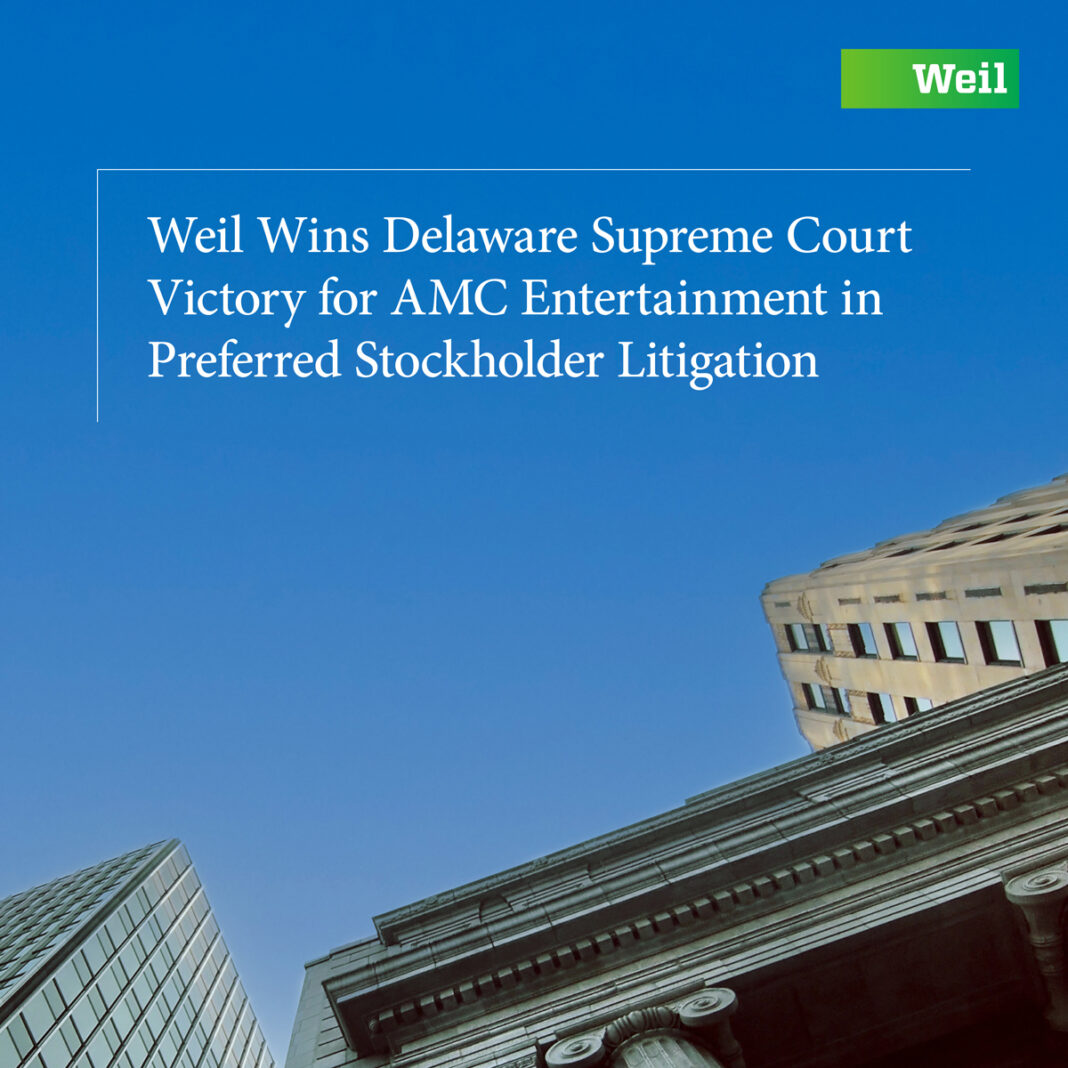A David and Goliath battle has reached its climax in the Delaware courtroom, with AMC Entertainment emerging victorious. The theater giant faced off against a group of disgruntled preferred stockholders, and in a stunning turn of events, the company secured a decisive win, thanks in part to the sharp legal maneuvering of the renowned law firm Weil Gotshal & Manges. This landmark case, with its implications for corporate governance and shareholder rights, has sent ripples through the financial world, raising questions about the future of preferred stock and the strategies corporations can employ to navigate complex litigation.
Weil’s Triumph: AMC Stockholder Litigation Resolved
The APE Saga: A Timeline of Disagreements

AMC’s Controversial Capital Structure Overhaul: Exploring the creation of APEs and the proposed reverse stock split
In 2023, AMC Entertainment (AMC) faced intense scrutiny and legal challenges over a proposed overhaul of its capital structure. The company’s plan involved the creation of a new class of preferred securities called “APEs,” alongside a proposed reverse stock split and subsequent conversion of APEs into common stock. This restructuring aimed to address AMC’s financial position and enhance its flexibility in navigating market conditions.
Shareholder Pushback: Examining the initial legal challenges and breach of fiduciary duty allegations
The proposed capital structure changes triggered immediate backlash from a significant number of AMC shareholders. A group of plaintiffs filed a lawsuit in the Delaware Court of Chancery, alleging that AMC’s senior management and board of directors breached their fiduciary duties to common stockholders. The plaintiffs argued that the creation of APEs and the subsequent plans for a reverse stock split and conversion diluted the voting power of common stockholders, potentially harming their interests.
A Negotiated Settlement: Analyzing the terms of the settlement and the common stock compensation provided
Just weeks before a scheduled preliminary injunction hearing, which could have significantly disrupted AMC’s plans, the legal battle took an unexpected turn. Weil, representing AMC, successfully negotiated a settlement agreement with the plaintiffs. The settlement, a complex and multifaceted agreement, included provisions for AMC to compensate common stockholders with additional shares of stock. This compensation aimed to mitigate the perceived harm resulting from the proposed reverse stock split and conversion of APEs.
A Legal Battle Takes Center Stage: The Court of Chancery and the Delaware Supreme Court
The approval of the settlement, a typically routine step in litigation, became a highly contentious issue, with an unprecedented number of objections filed. Despite the challenges, Weil’s legal team secured approval of the settlement, a critical victory for AMC, allowing the company to proceed with its capital structure overhaul.
However, the legal saga surrounding AMC’s APEs was far from over. Once the settlement payment was issued, a former holder of APEs brought a new legal action. This lawsuit alleged that the settlement payment violated anti-dilution and payment provisions outlined in the certificate of designations governing the rights of APEs before their conversion into common stock. The plaintiff argued that holders of APEs were entitled to the same consideration provided to common stockholders in connection with the settlement.
Last fall, the Delaware Court of Chancery granted AMC’s motion to dismiss the APE litigation. This decision marked a significant setback for the plaintiff and signaled a potential end to the years-long legal battle. Finally, last week, the Delaware Supreme Court affirmed the dismissal by the Court of Chancery, bringing to a close the hard-fought litigation stemming from the critical capital structure changes at AMC.
Settlement Approval: Overcoming Unprecedented Objections
In a testament to Weil’s legal prowess, the firm successfully navigated a complex and contentious settlement approval process. The settlement, a key milestone in resolving the litigation surrounding AMC’s capital structure overhaul, faced an unprecedented number of objections. Despite these challenges, Weil’s strategic arguments and unwavering commitment to their client’s interests ultimately secured the approval, paving the way for AMC to implement its planned capital structure changes.
The APE Holder’s Challenge: A New Front in the Litigation
Following the settlement’s approval, a new legal challenge emerged from a former holder of APEs, who alleged that the settlement payment violated anti-dilution and payment provisions outlined in the certificate of designations governing APE rights before their conversion into common stock. The former APE holder argued that holders of APEs were entitled to the same consideration as common stockholders received in connection with the settlement.
Strategic Dismissal and Finality
Weil, leveraging their deep understanding of securities law and corporate governance, successfully defended AMC against this new litigation. The Court of Chancery granted AMC’s motion to dismiss the APE litigation, finding no merit in the former APE holder’s claims. This decision was subsequently affirmed by the Delaware Supreme Court, bringing a definitive end to years of litigation stemming from AMC’s capital structure changes.
Weil’s Strategic Expertise: Navigating Complex Legal Terrain
John Neuwirth’s Leadership
Leading the charge for Weil was Global Litigation Department Co-Chair John Neuwirth. Neuwirth’s exceptional legal acumen and courtroom experience were instrumental in securing this resounding victory for AMC. His strategic guidance and unwavering dedication to the client’s best interests demonstrated Weil’s commitment to providing high-caliber legal representation in complex, high-stakes litigation.
Teamwork and Experience
The Weil team, assembled by Neuwirth, was a formidable force, bringing together a collective expertise in securities litigation and corporate governance. This specialized team, including Securities Litigation partners Josh Amsel and Matt Connors, and associates Tanner Stanley, Honghu Wang, Taylor Hoffman, and Stephanie Scanzillo, worked tirelessly to analyze the intricate legal issues involved and develop a winning strategy.
Implications for Corporate Governance
The outcome of this litigation has significant implications for companies considering similar capital structure changes. The Delaware Supreme Court’s affirmation of the dismissal underscores the importance of carefully considering the rights of all stakeholders, including preferred stockholders, when making such changes. It also highlights the need for companies to engage in robust legal counsel and due diligence to ensure compliance with applicable securities laws and contractual obligations. AMC’s experience serves as a valuable case study for other companies navigating the complexities of corporate restructuring and shareholder relations.
Conclusion
The Delaware Supreme Court’s decision in favor of AMC Entertainment, represented by Weil, marks a significant turning point in the ongoing battle between corporations and preferred stockholders. The court’s ruling clarifies the scope of a company’s fiduciary duty when facing dissenting shareholders, emphasizing the paramount importance of shareholder agreements and the flexibility they afford in structuring corporate relationships. This decision could have far-reaching implications for future corporate governance, potentially influencing how companies approach shareholder rights and the negotiation of preferential treatment. For AMC, this victory represents a substantial win, allowing them to maintain their control over the company’s future and pursue strategic initiatives without undue interference from preferred stockholders. However, the implications extend beyond AMC’s immediate circumstances. This case sets a precedent that may embolden corporations to assert greater autonomy in their dealings with preferred shareholders, potentially reshaping the power dynamic within corporate structures. As businesses navigate an increasingly complex regulatory landscape, the Delaware Supreme Court’s ruling serves as a stark reminder of the intricacies involved in balancing shareholder interests and corporate autonomy. It compels us to consider: what are the long-term ramifications of granting corporations greater flexibility in shaping shareholder relationships, and who ultimately bears the responsibility for ensuring fairness and transparency in these evolving dynamics?

